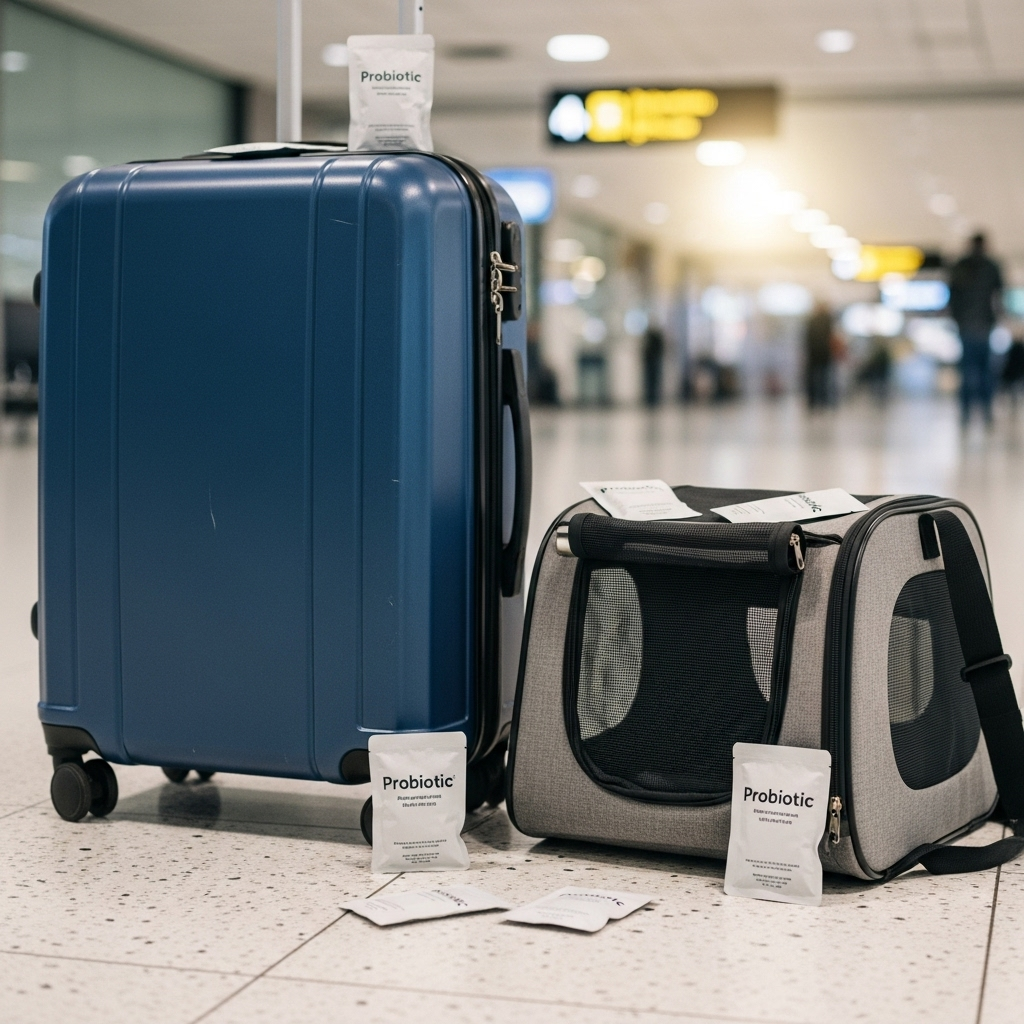Travel With Pets: Probiotic Tips to Reduce Tummy Upset

Traveling with a dog or cat can be rewarding but also stressful for your pet’s digestive system. Changes in routine, food, water, motion, and environment can all lead to loose stools, gas, or mild tummy upset. Probiotics are a helpful tool many owners use to support gut balance during travel. This guide offers practical, veterinarian-friendly travel tips probiotics for pets — how to choose and use them safely and what else to do to reduce digestive problems on the road.
Why travel often upsets a pet’s stomach
Several factors make travel a common trigger for gastrointestinal symptoms in pets:
- Stress and anxiety, which change gut motility and secretion.
- Diet switches or unfamiliar treats and restaurant/snack food.
- Exposure to different water sources and microbes.
- Motion sickness affecting digestion for car or plane travel.
- Changes in routine, exercise, and bathroom schedule.
How probiotics can help
Probiotics are live microorganisms that may help maintain a healthy balance of gut bacteria. For traveling pets, probiotics can:
- Support a balanced intestinal microbiome during stress or diet change.
- Help normalize stool frequency and consistency for minor upset.
- Reduce the duration and severity of mild, non-infectious diarrhea in some pets.
Important: probiotics are not a cure-all. They may reduce symptoms from non-serious causes but do not replace veterinary diagnosis or treatment for infection, severe dehydration, vomiting, or bloody diarrhea.
Choosing the right probiotic
When shopping for a travel probiotic, consider these travel tips probiotics for pets:
- Pick a pet-formulated product when possible — formulas for dogs and cats account for species differences and commonly used strains.
- Look for proven strains used in veterinary practice: Enterococcus faecium (often in FortiFlora-style products), Bifidobacterium species, Lactobacillus species, Bacillus subtilis, and Saccharomyces boulardii (a beneficial yeast).
- Check the CFU (colony-forming units) on the label; moderate doses per label or vet recommendation are generally effective. More isn’t always better.
- Choose stable formulations for travel: freeze-dried powders, single-serve sachets, chewables, or pastes designed to stay viable without refrigeration are convenient.
- Avoid giving human probiotics to pets without vet approval — strains and doses aren’t always appropriate.
Special considerations
Do not use live probiotics in severely immunocompromised pets, pets with indwelling central lines, or those recovering from certain surgeries unless your veterinarian approves. If your pet is on antibiotics, some probiotics (like Saccharomyces boulardii) can be given concurrently to reduce antibiotic-associated diarrhea, but always check with your vet for timing and product choice.
How to give probiotics while traveling
- Start early: begin probiotics 3–7 days before travel when possible. This allows time for the gut to adapt and may reduce the risk of immediate travel-related diarrhea.
- Follow dosing instructions: use the product’s recommended dose or your veterinarian’s specific instructions. Do not double-dose without advice.
- Mixing: many powders mix easily into a small portion of your pet’s regular food. Avoid adding large amounts of new food at once.
- Single-serve sachets or premeasured chews are easiest for day trips and flights.
- Storage: prefer shelf-stable or travel-friendly forms. If your probiotic requires refrigeration, bring an insulated cooler with cold packs and keep travel time minimal.
- Consistency: continue probiotics during the trip and for several days afterward if you started them beforehand. For short trips, a 3–7 day course around travel is typical; consult your vet for longer or recurrent travel.
Other travel tips to reduce tummy upset
- Maintain your pet’s regular diet as much as possible and bring familiar food and treats.
- Offer small, frequent meals rather than one large meal before travel to reduce motion sickness and digestive upset.
- Bring bottled water if you’re unsure about local water quality.
- Allow potty breaks and exercise to keep things moving and reduce stress.
- Pack a compact first-aid kit with electrolyte replacement, probiotic supply, stool sample container (if needed), and your veterinarian’s contact and medical records.
- Consult your vet about motion sickness medication, anti-nausea options, or prescription probiotics for high-risk pets.
Pros and Cons
| Pros | Cons |
|---|---|
| May reduce mild travel-related diarrhea and normalize stools | Not guaranteed to prevent infection-related diarrhea |
| Many travel-friendly, shelf-stable formulations available | Some pets may not respond; benefits are strain- and dose-dependent |
| Generally safe when used as directed and vetted | Not recommended without vet approval for immunocompromised or critically ill pets |
When to seek veterinary care
While mild diarrhea can be managed with probiotics and supportive care, see your veterinarian promptly if your pet shows any of these signs:
- Severe or persistent vomiting
- Bloody stool or black, tarry stool
- Marked lethargy, weakness, or collapse
- High fever or rapid dehydration (dry gums, sunken eyes)
- Diarrhea lasting more than 48–72 hours despite home care
FAQ
1. How soon before travel should I start probiotics?
Ideally start 3–7 days before travel so beneficial microbes can begin to colonize. If you can’t start early, beginning on travel day may still help but may take longer to show effects.
2. Can I give human probiotic supplements to my dog or cat?
Not without veterinary approval. Some human probiotics contain strains and doses that aren’t appropriate for pets. Choose products formulated for dogs or cats when possible.
3. Will probiotics prevent all types of diarrhea?
No. Probiotics can help with stress- or diet-related diarrhea and may shorten some cases of mild infectious diarrhea, but they do not replace veterinary care for severe infections, parasites, or systemic illness.
4. How long should I continue probiotics after the trip?
Continue for several days to a week after travel or as recommended by your vet to help the gut recover from stress and diet changes.
Key Takeaways
- Start probiotics a few days before travel when possible and use a pet-appropriate product.
- Choose travel-friendly formulations (sachets, powders, chews) and follow dosing instructions.
- Pair probiotics with other travel strategies: familiar food, small meals, water safety, and stress reduction.
- Probiotics help many pets but are not a substitute for veterinary care in serious cases.
- Always consult your veterinarian for pets with health issues, immunosuppression, or complex medication schedules.
Disclaimer: This article provides general information about travel tips probiotics for pets and is not a substitute for professional veterinary advice. Always consult your veterinarian before starting any new supplement, especially for pets with medical conditions, those on prescription medications, or immunocompromised animals. If your pet shows severe or worsening symptoms, seek immediate veterinary care.

Leave a Reply